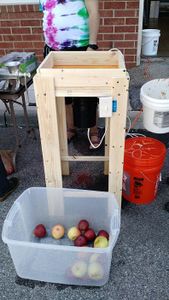Cider Making
The cider making process has three main steps:
- Acquire apples
- Grind apples to pulp
- Press the pulp to extract cider
For information on how to run Hacksburg's Annual Apple Cider Making Event, click here.
Acquiring apples
The apple season in Virginia begins in late June, but the majority of Virginia apples are harvested in September, October and early November. To make the best cider, it is advised to have a mix of sweet, sharp, and bitter flavored apples. Some examples of each of these are:
- Sweet
- Golden Delicious
- Fuji
- Gala
- Red Delicious
- Jonagold
- Honeycrisp
- Braeburn
- Sharp/Tart:
- Granny Smith
- Gravenstein
- McIntosh
- Northern Spy
- Winesap
- Liberty
- Bitter (including bitter-sweet and bitter-sharp/bitter-tart):
- Dolgo Crabapple
- Cortland
- Newtown
- Foxwhelp
- Porter’s Perfection
A good starting point for new cider makers is a mix of 50% sweet, 35% sharp, and 15% bitter apple varieties. However, feel free to experiment with whatever varieties and mixes you prefer.
It takes a lot of apples, about 14 pounds (or approximately 42 apples), to make 1 gallon of cider. We recommend beginners start with about 4 pounds of apples to make a quart of cider. While it is possible to buy apples at the store, it can be a lot more fun and a lot more affordable to buy local. A few apple orchards near Blacksburg include:
- Doe Creek Farm: Pick-your-own apples, Dwarf trees you can pick from the ground, $1/lb, Only 25 minutes from Blacksburg!, http://www.doecreekfarm.com/apples.php
- Johnson’s Orchard: Pick-your-own apples, $30/bushel, http://johnsonsorchards.com/index.html
- Wade’s Orchard: Apples available by lb., bag, bushel or truckload, price varies by quality (can purchase lower quality, cheaper apples for cider), http://www.wadesorchard.com/
- As of 9/2019, $8.50 per bushel seconds and $5 per bushel juicing apples
- Riner Food Center carries Wade's apples for $23 per bushel
- Ikenberry Orchards: $30/bushel, $1.69/lb, www.ikenberryorchards.com
- And many more: https://bestthingsva.com/apple-picking/
- You can also purchase apples at the Blacksburg Farmer's Market (held every Saturday from 8 to 2) from Ayer's Orchard or Morgan Orchard
Be sure to call ahead before visiting an orchard as not all varieties may be available and pick-your-own may be limited to certain days of the week.
Grinding Apples to Pulp
Before the apples can be pressed, they must be crushed into a pulp called the mash. There are many ways to do this. The traditional method uses what’s called a “scratter”, which has a toothed rotating drum that crushes and shreds the apple. These are specialized tools, however, and can be expensive to purchase or difficult to construct.
One of the cheapest ways to make pulp is to put the apples into a bucket and smash them with a heavy piece of wood. Be sure the wood is not treated, or you can contaminate the apples with harmful chemicals. Other methods include using a blender or a meat grinder, however these are limited to small quantities of apples and require a lot of effort.
A more recent method, and the one used at Hacksburg, uses an in-sink garbage disposal to create the mash. (The disposal was purchased new and was thoroughly cleaned before use!) We found this method to be cheaper than a purpose built scratter and much easier than other methods. The picture to the left shows the apple pulper in use at last year’s cider making event.
Press the pulp to extract cider
Now the fun part! To extract the juice from the apple mash, it must be pressed with a large amount of pressure. To do this, we built a cider press out of 2x4 lumber and a 4 ton hydraulic bottle jack.
To keep the pulp from being squeezed out with juice, it is wrapped in cloth or thin mesh. A few small bags are made, called cheeses, which are stacked between flat plates, called racks. If only a single large bag is used, the pressure isn’t distributed evenly and not all of the juice is extracted. The racks help to distribute the pressure and extract as much juice as possible.
Be sure to bring thoroughly cleaned containers large enough to hold all of your cider. Unclean containers can effect the flavor of the cider and may contaminate your cider. Popular containers include canning jars, plastic jugs (from milk or juice), and glass jugs and bottles. A good source for new glass containers locally is Eats Natural Foods on North Main Street. They also carry a large selection of supplies useful for making hard cider.
Enjoy!
Raw apple cider should be consumed as soon as possible for best flavor and will keep approximately 10 days to 2 weeks if refrigerated. Your cider can be used to make apple cider vinegar or hard cider, although you may want to change your ratio of apples for the best flavor.



